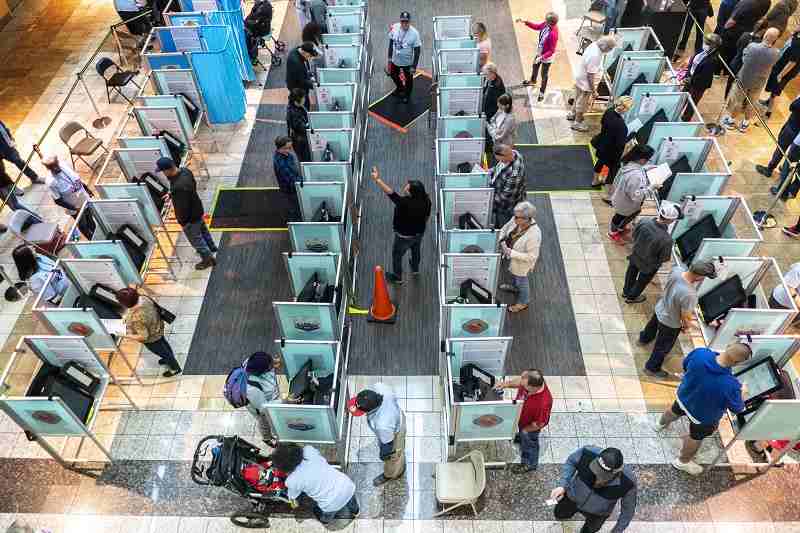
Clark County poll workers work quickly to usher in the long lines of voters wanting to vote on the last day of early voting at the Galleria Sunset Mall in Las Vegas, Nevada Friday November 4, 2022.
12:15 JST, November 6, 2022
Democrats this weekend are bracing for potentially steep losses in the House and scrambling to retain control of the Senate and governorships around the country as a midterm election season that bore some surprises comes to a close by adhering to convention, with the party out of power claiming momentum.
Republicans are well-positioned to retake the House as they have moved aggressively into Democratic territory by tapping into voters’ anxiety about inflation and crime, and have benefited from disapproval of President Biden’s leadership.
Republicans need to pick up just five seats to win back the House, but the atmosphere is so murky that some Democratic strategists privately acknowledge that a loss of 20 seats would be a good night. The outcome is less predictable in the Senate, as uncertainty hangs over contests in Georgia and Nevada, long considered dead heats, and races for Democratic-held seats in Arizona, New Hampshire and Pennsylvania have all tightened in the final stretch, boosting GOP hopes to net the one seat required to gain control of the upper chamber. Meanwhile, Democrats are suddenly on the defensive in the governor’s race in New York, long a stronghold for the party, and in Oregon.
“Republicans are turning out,” Adam Laxalt, the GOP Senate nominee in Nevada, said at a campaign event Friday night in North Las Vegas. “Democrats . . . what do they have to be motivated about? This is our shot.”
Recent history has dictated that the president’s party loses seats in midterm elections, but Democrats thought they might defy that trend. Energized by the end of Roe v. Wade and buoyed by the GOP’s elevation of polarizing, often untested candidates loyal to former president Donald Trump, Democrats sought to frame the midterms as a reckoning with Republican extremism rather than a referendum on the current president.
“Democrats even having a shot at having a decent night is unprecedented in the political environment we’re living in,” said Chuck Rocha, a veteran Democratic strategist working on many races this year. “The off-year election, the president, redistricting, inflation – my God. How are Democrats not going to lose everything?”
Now many worry that a strong night nationally for Republicans could wallop candidates up and down the ballot who had been holding their own – though some Democrats say that they long expected key races to narrow and that they remain hopeful.
“Republicans came home in August and September, and they’re coming home now. They’ve solidified,” said Celinda Lake, a lead pollster for Biden’s 2020 campaign.
The trend extends to some of the most Democratic jurisdictions, including New York, where Gov. Kathy Hochul (D) is in an unexpectedly tight reelection fight and where Rep. Sean Patrick Maloney, chair of the Democratic Congressional Campaign Committee, is at risk of losing in a district where Biden once won by 10 points and where Republicans dramatically ramped up their spending last month.
Confident they will be in the majority in at least the House next year, Republicans are already planning to launch oversight investigations into the Biden administration, from the Justice Department to the coronavirus pandemic response. GOP control of the Senate as well could hold up confirmation of Biden’s judicial and executive branch appointees and strengthen the party’s hand in potential fights to repeal Biden’s legislative achievements from his first two years in office.
Leaders of both parties have been traveling to battleground states in the final days, trumpeting their closing messages and trying to boost turnout among base voters. Democrats are trying to hammer home an urgent message about heightened threats to the democratic process, with Biden warning this week of a “path to chaos” as many GOP nominees deny the 2020 election results and some refuse to say they will accept this year’s outcomes.
A majority of GOP nominees for House, Senate and key statewide offices have denied or questioned the 2020 results, an alarming tally in the first election since a pro-Trump mob attacked the U.S. Capitol on Jan. 6, 2021, to disrupt certification of the vote.
Yet candidates and strategists acknowledge that for many Americans, immediate problems such as inflation will trump more existential concerns about democracy.
“I understand that democracy might not seem like a top priority right now,” former president Barack Obama conceded this week at a rally in Nevada, one of many energetic appearances he has made in recent days as the Democrats’ biggest star.
Democrats have pivoted to sharper messaging aimed at people’s pocketbooks, casting Republicans as threats to Medicare and Social Security, but some strategists regret not focusing on these issues sooner.
“We had a very strong contrast on the economy and we should have been talking about it more,” Lake said. “I just hope it’s not too late.”
Republicans are heading into Election Day with a slight edge in many polls of generic matchups, and some GOP operatives once wary of the fallout from overturning Roe say those worries have evaporated. While the abortion issue seemed to sway suburban women and other key swing groups, some polling shows those voters shifting back toward the GOP.
The calculus is simple for voters like Patty Fulgenzi of Maple Valley, Wash., who said her retirement budget is strained to the point she’s considering going back to work. “The last two years, things just seem to get worse,” she said at a recent rally for Matt Larkin, the Republican challenging her congresswoman, Democrat Kim Schrier. “I’m hoping for change.”
Below is a look at the battle for control of the Senate and the House, as well as a survey of the most-watched governor’s races coast to coast.
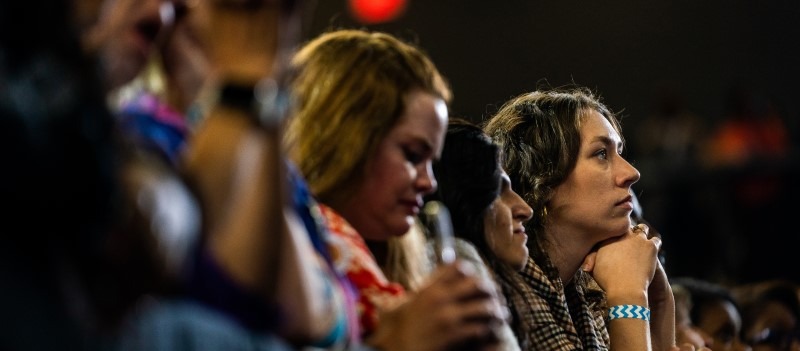
Supporters listen to Former US President Barack Obama deliver remarks during a rally with Senator Raphael Warnock (D-GA) and Stacey Abrams at The Gateway Center in College Park, Ga on Friday October 28, 2022.
***
The Senate
The race for control of the Senate is remarkably close, and Republicans need a net gain of just one seat to win the majority. Polling averages put at least eight Senate races within 5 percentage points, and while many Republican candidates have made measurable gains in recent weeks, each side still has a plausible path to the majority.
Republicans are challenging Democratic incumbents in purple states including Arizona, Georgia, Nevada and New Hampshire where Biden’s approval ratings have fallen since he carried those states in 2020 and voters express a dreary view of the economy. Republican-held open seats in Pennsylvania, Ohio and North Carolina are also friendly terrain for Republicans. But some early recruitment failures on the Republican side combined with Trump endorsing inexperienced candidates in bruising primaries has complicated the party’s path to the majority.
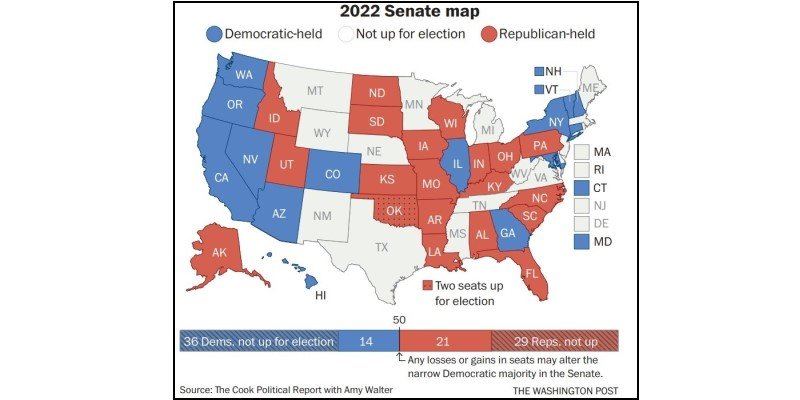
The pure toss-ups
Republicans see their top pickup opportunity as Nevada: Sen. Catherine Cortez Masto (D) is locked in a close race with former state Attorney General Adam Laxalt (R), whose father and grandfather were both senators. Privately, national Democrats concede this is their toughest race, and are hoping the state’s Democratic turnout machine is able to push Cortez Masto over the edge.
Cortez Masto, the first Latina elected to the Senate, has hammered Laxalt over the issue of abortion in the largely pro-abortion rights state, reminding voters he once called Roe v. Wade a “joke,” and supports a referendum to ban abortion in Nevada after 13 weeks of pregnancy.
But Laxalt, who chaired Trump’s 2020 Nevada reelection effort and pushed his false claims of voter fraud, is betting the economy will be top of mind for voters. Nevada’s tourism-based economy has been hit hard since covid, and the state also struggles with high gas prices.

A supporter carries a lawn sign at the Herschel Walker Unite Georgia Bus Stop rally at the Global Mall in Norcross, Ga on Friday September 9, 2022.
Georgia could once again determine which party controls the Senate: Former football star Herschel Walker, the GOP nominee, has made gains in his race against Democratic Sen. Raphael G. Warnock despite allegations from two women that he paid for abortions and threatened his ex-wife’s life.
Warnock, the senior pastor at Ebenezer Baptist Church in Atlanta, has warned that voters can’t depend on Walker. “If we can’t trust him to tell the truth about his life, how can we trust him to protect our lives and our families and our children and our jobs and our future?” he asked at a recent campaign stop.
Walker has higher unfavorable ratings than Warnock, but Republicans are nevertheless coalescing around him, illustrating the partisan divide in a state that was solidly Republican until two years ago, when three Democrats won statewide: Biden, Warnock and Sen. Jon Ossoff.
Democrats hope some Republican voters uneasy over Walker’s personal issues will leave their ballots blank, boosting Warnock. But Senate Majority Leader Charles E. Schumer (D-N.Y.) was overheard late last month privately telling Biden things were going “downhill” for Democrats in the state.
If neither candidate clears 50 percent, a runoff election would occur in December, meaning control of the Senate could hang in the balance for a month.
The race for Pennsylvania’s open Senate seat has been an expensive roller coaster ride: GOP celebrity doctor Mehmet Oz has gained ground since the summer against Lt. Gov. John Fetterman (D), who suffered a stroke earlier this year. It’s the most expensive race of the cycle, according to OpenSecrets, attracting more than $300 million in total spending.
Democrats have attacked Oz over his authenticity, portraying him as a slick TV hustler who is also an outsider to the state.
Republicans, meanwhile, have raised questions about Fetterman’s fitness for office as he recovers from his stroke, running ads featuring footage from the candidates’ lone debate that show Fetterman struggling with his words. They also attack Fetterman relentlessly on crime, portraying him as too liberal for the state.
Wisconsin is trending red but still competitive: Sen. Ron Johnson (R) is fighting for a third term in what has appeared to be an expensive success story for Republicans so far, although polls show that Democratic Lt. Gov. Mandela Barnes still remains competitive there.
Johnson, a former plastics manufacturer who had become unpopular in the state, looked deeply imperiled earlier this year. But GOP groups then unleashed a torrent of attacks on Barnes, using his past statements to portray him as a radical who is soft on crime.
Barnes, who is seeking to become the first Black senator to represent the state, has attacked Johnson for downplaying the Jan. 6, 2021, insurrection at the U.S. Capitol and attempting to deliver a slate of false electors from Wisconsin in the 2020 presidential election.
Where Democrats are increasingly vulnerable
A strong incumbent might be in trouble: Arizona Sen. Mark Kelly, a former astronaut and Navy pilot, is struggling to stave off a challenge from GOP nominee Blake Masters, a venture capitalist and the protege of Silicon Valley billionaire Peter Thiel.
Kelly has portrayed himself as an independent voice who has confronted his party on the issue of border security, but Masters has worked to paint him as a rubber stamp for Biden in a state that has more Republican voters than Democratic ones.
Masters emerged from the Republican primary with high unfavorable ratings, though conservatives have started coming home to him in recent weeks. He supports a national abortion ban and has boosted Trump’s false claims of voter fraud, which Democrats have said makes him too extreme for a state that has tended to support senators who buck the party line.
A late Republican surge in New Hampshire has Democrats worried: Don Bolduc has made late gains in the race against Democratic Sen. Maggie Hassan, who won her seat six years ago, beating incumbent Republican Kelly Ayotte by just a little over 1,000 votes.
Hassan was once considered to be one of the Democrats’ toughest candidates to defend this cycle, but after Bolduc, a retired Army general, emerged from the September primary as the Republican nominee instead of an establishment-backed candidate, polls showed Hassan comfortably ahead. Since then, Bolduc reversed his earlier false position that the 2020 election was stolen and has consolidated the Republicans around him. Hassan has pointed out Bolduc’s past support for abortion restrictions in the very pro-abortion rights state that’s tended to back more middle-of-the-road candidates.
The state could provide an early indicator of how the elections are going, since polls close at 7 p.m. Eastern time.
Where Republicans are more vulnerable than they should be
Ohio is competitive despite leaning Republican in past years: This race has drained considerable resources from Republican groups as GOP Senate candidate J.D. Vance seeks to defend the red state from former Democratic Rep. Tim Ryan’s surprisingly strong challenge.
Republicans concede Ryan has run a solid race by portraying Vance, who was born in Ohio and later attended Yale Law School before moving to San Francisco, as an elite outsider. Ryan’s prodigious fundraising also allowed him to flood the airwaves with ads separating himself from national Democrats.
The races further out of reach
North Carolina could stay Democrats’ white whale: Polls suggest that the race for an open seat in North Carolina, which has been out of reach for national Democrats in recent cycles, appears to be leaning toward Republican Rep. Ted Budd over the Democratic nominee, Cheri Beasley, the former chief justice of the state Supreme Court.
But recent polls show the race still within a few percentage points, and Beasley, the first Black woman nominated for the Senate from North Carolina, has tried to separate herself from national Democrats and focused on economic issues.
Republicans have strong candidates in Colorado and Washington, which could flip these seats red: In the Democratic-controlled states of Colorado and Washington, Republicans have touted their Senate candidates, Joe O’Dea and Tiffany Smiley, respectively, as two of their best recruits.
O’Dea, the owner of a construction business, is pro-abortion rights and opposes Trump’s running for president again, dispensing with two pieces of baggage that could hurt him with independents in the state as he challenges Sen. Michael F. Bennet (D). And in Washington, Tiffany Smiley, a nurse and first-time candidate, is mounting a spirited challenge to Sen. Patty Murray (D).
Polls show both Republicans trailing the Democratic incumbents, but a big red wave on Tuesday could lift them to surprising victories.
***
The House
In the House, Republicans only need to net five seats to regain the majority, a feat that appears well within reach as worries over rising prices, crime and other issues have solidified support for GOP candidates in recent weeks.
The most vulnerable Democrats
Thirty-nine Democrats are on the front lines: They’re defending the House majority, according to the Democratic Congressional Campaign Committee, and represent true swing districts sprinkled across the country.
Most of them are members from the majority-making class of 2018, in which Democrats flipped 41 GOP seats after promising to protect health-care access and restore competence in government two years into Trump’s presidency. These front-liners are defined by their pragmatic approach that often rebukes the extremes, which sets them at odds with their more liberal colleagues.
Republicans and Democrats have consistently cited the seats held by Reps. Cindy Axne (D-Iowa), Tom Malinowski (D-N.J.), and Elaine Luria (D-Va.) as the most reliable flips for the GOP.
Many Democratic members, aides and strategists are telegraphing that losses on the East Coast could set the tone for the rest of election night. Besides Luria, two other Virginia Democrats, Abigail Spanberger and Jennifer Wexton, are ones to watch because if either is defeated – especially Wexton, whose district is considered safer – it could mean Democrats are in for a tough night.
Democrats in deep-blue districts could be in trouble too
Republicans believe if they can flip Democratic seats not only in front-line districts but also in New England, California and Oregon, they could rack up 20 new seats or more.
New York contains surprise Republican opportunities: Democratic retirements in Long Island have put two seats up for grabs, as voters’ concerns about crime and high prices in New York City spill over. Maloney has been a GOP target all cycle, and his Hudson Valley district is in play, frightening Democrats about their chances in three additional Upstate New York districts.
In California, a possible Republican resurgence: Both parties are eyeing six seats in California. Rep. Julia Brownley’s (D) – whose district Biden won by 20 percentage points two years ago – has been moved closer to toss-up territory, according to The Cook Political Report with Amy Walter. Republicans believe they can flip an open seat as well as those of Reps. Katie Porter and Mike Levin in Southern California. Democrats, meanwhile, see a rare opportunity to flip a district, targeting Rep. David G. Valadao after redistricting made his district more favorable for Democrats.
Republicans eye Connecticut: Only recently did Democrats start to fear that they could lose Connecticut’s 5th District. By defeating Rep. Jahana Hayes, Republicans could break a Democratic hold here going back almost two decades and tear into the party’s New England “blue wall.”
And Rhode Island: A similar trend is occurring in Rhode Island’s 2nd District where Republicans nominated a formidable candidate in Allan Fung, the mayor of Cranston, against Democrat Seth Magaziner. A win by the Republicans here would be seismic and could indicate a blowout night for the party.
A progressive could cost Democrats in Oregon: Both parties are eyeing three seats in Oregon, more than usual for a reliably blue state. It’s likely at least one flips after Democratic primary voters in the 5th District, outside of Portland and Salem, ousted moderate Rep. Kurt Schrader (D) for liberal Jamie McLeod-Skinner. A victory by the Republican candidate, Lori Chavez-DeRemer, would be historic, making her the first Latina to serve from a district Republicans haven’t represented since 1997.
But Republicans have their own problems
There are three House seats where Trump-endorsed candidates appear to be diminishing Republicans’ chances for what should have been easy pickups.
In Michigan, election denialism may turn off suburban voters: Republican John Gibbs defeated Rep. Peter Meijer (R-Mich.) in Michigan’s 3rd District Republican primary after rebuking Meijer for voting to impeach Trump following the Jan. 6 attack. But Gibbs’ strong Trump bona fides, coupled with his writings declaring women shouldn’t have the right to vote, are tough for a general electorate in which independents are a key persuadable group.
A Jan. 6 attendee may be a bridge too far for Ohioans: Rep. Marcy Kaptur (D) was poised to lose in Ohio’s 9th District, which voted solidly for Trump, but her GOP opponent, J.R. Majewski, may have sunk his own chances after lying about his military record. He has also spread QAnon conspiracy theories, violated federal law for failing to disclose personal finances, and attended the Jan. 6 rally at the Capitol.
Scandal could sink a North Carolina Republican: Sandy Smith propelled to victory in the primary in North Carolina’s 1st District after receiving Trump’s endorsement, but her MAGA bona fides and domestic abuse allegations from her ex-husbands have made it more difficult for her to win over independent voters. Smith has also pushed Trump’s 2020 election lie and was outside the Capitol on Jan. 6.
Republicans also could lose some seats thanks to redistricting
In Ohio, a seven-term incumbent might be out: Rep. Steve Chabot (R) is seeking his seventh term in Ohio’s 1st District, but it has been redrawn to favor Democrats, making his chances of survival slim.
The end of the road for one of the few remaining Republicans who voted to impeach Trump: Valadao (R-Calif.) survived an incredibly tight primary race in California’s 13th District even after having voted to impeach Trump following Jan. 6. Redistricting is also working against him now that the boundaries have made it a district Biden would have won by 10 percentage points.
In New Mexico, a trade-off: Rep. Yvette Herrell (R-N.M.) swung dramatically from running in a reliably safe seat to a district that Biden would have carried by 4 percentage points.
Republicans tried to shore up a district in Nebraska, but it might not be enough: Rep. Don Bacon (R) has repeatedly eked out reelection in Nebraska’s 2nd District, which is often considered the most vulnerable for the GOP. Though redistricting has made it slightly more favorable for Republicans, Bacon now faces a more moderate Democratic challenger, rather than the liberals of years past.
But if Republicans do win big, look for a diverse freshman class
Hispanic voters could propel three Texas Latinas to Congress: One of the biggest trends to emerge from the 2020 presidential election was Hispanic voters’ gravitation toward the GOP, especially in South Texas. Voters in the Rio Grande Valley have the chance to send three GOP Latinas to Congress – a historic feat for a region that has been represented historically by male Democrats.
Thirty-three Latino Republicans are on the ballot elsewhere, from Florida to Oregon, that could help double the representation they have in the conference if they win. Roughly 30 Black Republicans are also on the ballot. Two of them, John James in Michigan and Wesley Hunt in Texas, are expected to win, which could double the number of Black Republicans serving in the House from two to four. And with 13 Asian American Republicans running for the House, those ranks could expand as well.
Regardless of Tuesday’s outcome, we are likely to witness the largest number of Republican women serving in the House’s history. Eighty are on the ballot, 27 of them incumbents seeking reelection.
***
The Governors
Governors will be elected Tuesday in 36 states, with 20 held by Republicans and 16 by Democrats.
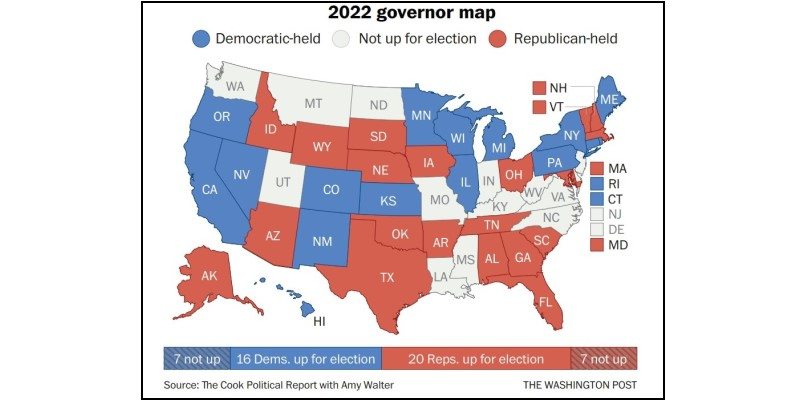
Where the choice couldn’t be starker
Arizona voters face a big decision: The woman who oversees the state’s elections process, Democratic secretary of state Katie Hobbs, or a former TV anchor who embraces Trump’s lie that his election was stolen, Republican Kari Lake.
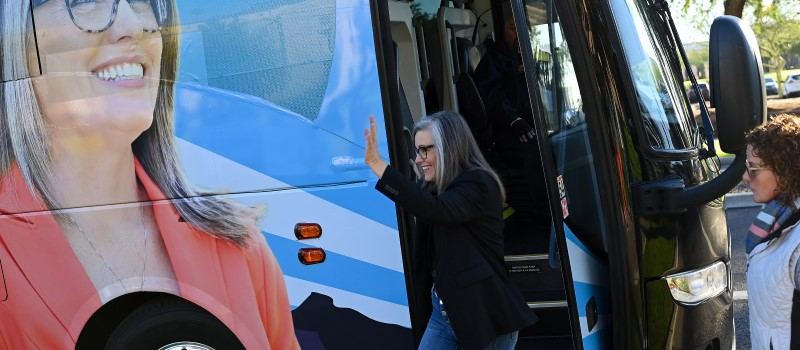
Democratic candidate for Arizona governor Katie Hobbs exit her campaign bus to greet volunteers outside the Arizona State Capitol on November 4, 2022 in Phoenix, Arizona. Hobbs is challenging Republican candidate Kari Lake in the upcoming Arizona midterm elections next week.
The two are vying to replace Gov. Doug Ducey (R), who is term-limited, in a state Biden narrowly won two years ago. Polls show them nearly dead-even, though support for Hobbs has softened in recent weeks and support for Lake has slightly improved.
The two candidates are as different in style as they are on substance. Lake is brash and polished, rallying the base of the GOP with praise for Trump and dire warnings about election integrity as well as illegal immigration. Hobbs is much more low-key, sticking to a campaign script and warning of Republican attempts at voter intimidation. Hobbs refused to debate, saying she doesn’t want to take part in her opponent’s “spectacle,” a decision that has become fodder for attacks from Lake and other Republicans.
In Pennsylvania, election denialism has also taken center stage: Except in this race, Democrat Josh Shapiro, the state attorney general, is running significantly ahead of his Republican opponent, Doug Mastriano, an army veteran and state senator who denies the result of the 2020 election and openly embraces Christian nationalism.
Mastriano has shunned the mainstream media and come under fire for paying consulting fees to the far-right social media website Gab. He has also been accused of using anti-Semitic dog whistles to refer to Shapiro, who is Jewish. Mastriano attacked Shapiro for sending his children to a private Jewish school that he called “exclusive [and] elite” and said it was a sign of Shapiro’s “disdain for people like us.”
A long-awaited rematch
In Georgia, two foes meet again: Democrat Stacey Abrams is trying to avenge her narrow 2018 loss to Republican Gov. Brian Kemp. Abrams, who would be the first Black female governor in U.S. history, has spent the past four years building a national reputation as an advocate for voter registration and access to the ballot, based on her record registering hundreds of thousands of new voters in Georgia and helping deliver the state for Biden in 2020.
Kemp, meanwhile, developed a reputation of his own for standing up to Trump and refusing to bend to the lie that Biden’s narrow victory in Georgia was “stolen.” In the Republican primary earlier this year, Kemp soundly defeated former senator David Perdue, a Trump-endorsed challenger, to win their party’s nomination.
Kemp has led Abrams by 4 or 5 percentage points in most polls, a wider margin than his 1.4-point squeaker of a victory in 2018. Abrams has countered that polling does not capture the young and newly registered voters who she believes will support her. She will need a huge turnout of Black voters to overcome her deficit in the polls. Early voting, which traditionally has shown strong Black turnout, hit a record this week for a midterm election.
Who wins these governor’s races tells us more about 2024 than 2022
Florida will be watched as a prelude to the next presidential campaign: Gov. Ron DeSantis (R) is facing Democrat Charlie Crist, himself a former governor, and polls indicate that DeSantis holds a comfortable lead. In the four years since he was narrowly elected governor, DeSantis has helped transform Florida’s politics; registered Republicans in the state now outnumber Democrats by 300,000.
DeSantis has proved a prodigious fundraiser. His political operation has raised more than $200 million in this election, according to the nonprofit OpenSecrets, a record for a sitting governor. National Democrats, meanwhile, have declined to plow significant resources into helping Crist, who has struggled to gain momentum in the polls.
How well DeSantis performs with key constituencies, such as Latino voters, could bolster a possible run for president. Some experts believe DeSantis could be the first Republican gubernatorial candidate in 20 years to win Miami-Dade County, the state’s most populous and a majority-Hispanic jurisdiction that has long been a Democratic stronghold.
California also could be a prelude to 2024: There is little suspense about who will win the governor’s race in California. The only question is what it might signal about the presidential ambitions of Gov. Gavin Newsom (D), who is widely expected to cruise to reelection.
Newsom, a former San Francisco mayor and a fixture in California politics, is seeking a second term in a contest against Brian Dahle, a Republican state senator and farmer from Northern California. In September 2021, Newsom defeated an effort to recall him, a show of strength that all but eliminated questions about whether he could win reelection this fall.
Newsom has cast himself as a national leader for liberal causes, eager to take on Republican counterparts such as DeSantis. Earlier this year, Newsom launched television ads in Florida urging residents to move to California, saying their freedoms were at risk. He also paid for billboard advertisements in conservative states touting access to abortion in California. Newsom is considered a potential presidential candidate, especially if Biden does not seek a second term, though Newsom committed in a recent debate to serving four more years as governor if he won another term.
Where Democrats won four years ago, Republicans see opportunity
Democrats hope to capture lightning twice in deep-red Kansas: Gov. Laura Kelly (D) is attempting to win reelection in a predominantly Republican state in a year that favors Republicans.
Kelly’s Republican opponent, state Attorney General Derek Schmidt, has attempted to make the race a referendum on national politics, linking Kelly to Biden at every opportunity. Kelly, by contrast, has only talked “about Kansas from April onward,” said Bob Beatty, a political scientist at Washburn University in Topeka. She has also reminded Kansans of the controversial tax-cutting experiment implemented by former Republican governor Sam Brownback and later reversed by lawmakers.
To overcome a political atmosphere that favors the GOP, Kelly has tried to cultivate a brand of independence. She has received endorsements from former Republican officeholders in Kansas and one of her ads even included a clip of her meeting with Trump.
Voters in Kansas surprised pundits earlier this year when they roundly rejected an antiabortion amendment to the state constitution. By contrast, few are making firm predictions about the governor’s race, which is considered a toss-up.
Battleground Wisconsin may come down to the wire: Democratic Gov. Tony Evers, a former state schools superintendent, is seeking reelection in a tight contest against Republican Tim Michels, a construction executive.
Michels has made inroads with voters by focusing on concerns about inflation and public safety, including the unrest that followed a police shooting in Kenosha in 2020. He has also echoed false allegations of voter fraud, saying he was unsure whether the 2020 presidential election was stolen. Michels wants to replace the state’s bipartisan election commission with a new body but has provided few details.
The two candidates have clashed over abortion. A total ban on the procedure dating back to 1849 came into effect in Wisconsin after the Supreme Court struck down Roe v. Wade. Evers tried to initiate a state referendum on the ban but was blocked by the Republican-controlled legislature. Michels has said that he would support legislation to include exceptions for rape and incest.

Nevada Governor Steve Sisolak gets into an SUV after walking through a Day of the Dead Festival during Nevada Day weekend in Reno, Nevada Sunday October 30, 2022.
Nevada Republicans optimistic about their chances of ejecting a Democratic incumbent: Gov. Steve Sisolak, a former member of the powerful Clark County Commission, was elected in 2018, the first Democrat to win the governorship in 20 years. His Republican opponent in this year’s election is Clark County Sheriff Joe Lombardo. In their previous roles, the two men worked together closely.
Lombardo has hammered Sisolak over rising prices and unemployment during the acute phase of the pandemic, which devastated Nevada’s tourism-driven economy. While Lombardo was endorsed by Trump, he has waffled on how closely to bind himself to the former president. He has said he does not think the 2020 presidential election was stolen. During a debate last month, Lombardo was asked whether he considered Trump a “great” president. Lombardo said he would not use that adjective, calling Trump a “sound” president instead. Hours later, he put out a statement reversing himself.

Republican gubernatorial nominee Sheriff Joe Lombardo gives candy to children while meeting Nevada voters during Nevada Day Parade in Carson City, Nevada Saturday October 29, 2022.
Nevada is a state where voters are less likely than in some others to split their ballots between two parties, some strategists say, meaning the governor’s race could mirror the Senate race.
In Michigan, Democrats try to fend off a Trump-backed challenger: Gov. Gretchen Whitmer (D) is facing Republican Tudor Dixon, a conservative commentator and first-time candidate, who has been gaining on Whitmer in the polls, though the Democratic incumbent still leads and has a massive cash advantage.
Michigan has been the scene of one of the most intense battles over abortion in the post-Roe era, with Whitmer suing to prevent the state’s 1931 abortion ban from taking effect.
On Tuesday, Michigan voters will also decide whether to enshrine a right to abortion in the state constitution, a high-stakes gambit likely to bring both supporters and opponents of abortion rights to the polls. Only two other states – California and Vermont – are weighing similar ballot questions, and neither has a competitive governor’s race.
Dixon has attempted to downplay abortion as a factor in the campaign, saying the issue is “off the table” in the race to select the next governor. Instead, she has attacked Whitmer on rising prices, pandemic-era restrictions and education.
Whitmer, who is seen as a potential future presidential candidate, has been playing up her work addressing local concerns, like repairing roads and bridges.
Deep blue terrain Republicans are eyeing
One of the biggest surprises could be in New York: Once considered an easy win for Democrats, the race for governor has tightened considerably and polls show a shrinking lead for Gov. Kathy Hochul (D), a native of the Buffalo area, in her contest against Rep. Lee Zeldin (R-N.Y.), a member of Congress from Long Island.
Zeldin’s campaign has revolved around a single issue: crime. Hochul, meanwhile, has emphasized Zeldin’s closeness to Trump and his antiabortion views.
Hochul was named governor in 2021 when her predecessor, Andrew M. Cuomo, resigned in the wake of a sexual harassment scandal. She is the first female governor of New York and is looking to make history as the first woman elected to the post.
A loss by Hochul in a state where Democratic voters outnumber Republicans by two to one would be a seismic shock. In the closing days, both national parties are spending money there, and high-profile Democratic surrogates are rushing in to help Hochul.
Oregon could elect a Republican governor for the first time in 40 years: Polls indicate that the contest is a toss-up between Republican Christine Drazan, a state legislator, and Democrat Tina Kotek, the speaker of the state house of representatives.
The closeness of the race in deep-blue Oregon reflects an unusual confluence of factors. The outgoing governor is Democrat Kate Brown, who is term-limited and unpopular. Kotek has worked to distance herself from Brown and promised to address concerns over a homelessness crisis and gun violence in Portland, the state’s largest city. A third candidate, Betsy Johnson, a Democrat-turned-independent who is well funded, is winning up to 10 percent of the vote, according to recent polls, which complicates Kotek’s path to victory.
Top Articles in News Services
-

Survey Shows False Election Info Perceived as True
-

Prudential Life Expected to Face Inspection over Fraud
-

Hong Kong Ex-Publisher Jimmy Lai’s Sentence Raises International Outcry as China Defends It
-

Japan’s Nikkei Stock Average Touches 58,000 as Yen, Jgbs Rally on Election Fallout (UPDATE 1)
-

Japan’s Nikkei Stock Average Falls as US-Iran Tensions Unsettle Investors (UPDATE 1)
JN ACCESS RANKING
-

Japan PM Takaichi’s Cabinet Resigns en Masse
-

Japan Institute to Use Domestic Commercial Optical Lattice Clock to Set Japan Standard Time
-

Israeli Ambassador to Japan Speaks about Japan’s Role in the Reconstruction of Gaza
-

Man Infected with Measles Reportedly Dined at Restaurant in Tokyo Station
-

Videos Plagiarized, Reposted with False Subtitles Claiming ‘Ryukyu Belongs to China’; Anti-China False Information Also Posted in Japan

























